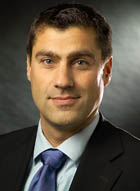?DKK 15 million for research in ten minutes
There is a major difference between applying for money from a private foundation and a public grant giver. ?When Philipp Schröder from the Department of Economics and Business was promised DKK 15 million from the Tuborg Foundation, the final decision was made in just ten minutes.
In November 2012, Philipp Schröder anxiously presented his plans to spend a DKK 15 million grant on establishing a new research centre in export-based economy in front of the board of the Tuborg Foundation.
?He had been informed that after one and a half years of close dialogue with the foundation, he would only have one chance. The board of the foundation, which consists of experienced researchers such as Søren Isaksen and Flemming Besenbacher, wanted a short and concise presentation.
?After the short presentation, he was asked to wait outside the room. Ten minutes later the door opened, and the chairman of the board gave him the good news that he would be granted the DKK 15 million.
?According to Philipp Schröder, who is now head of the Tuborg Center for Research on Globalisation and Firms, the process has been symptomatic of the difference between applying for money from a private foundation such as the Tuborg Foundation and, for instance, the research councils.
?- The decision-making process is very short. ?The board consists of experienced researchers, and they quickly assess whether the research has any substance. Subsequently, they expect to get clear answers to the few incisive questions that they ask, after which they are ready to make their decision. As a researcher, it is both challenging and quite different from the usual working process, says Philipp Schröder.
?Close dialogue in the application process
?Philipp Schröder’s grant of DKK 15 million is the second grant in a row that he has received from the Tuborg Foundation. He received the first grant of DKK 5.8 million in 2008. The aim of the Tuborg Foundation is: “to work for the development and implementation of socially beneficial initiatives and activities, particularly in support of the Danish business community.”
?The significance of this aim has been evident in the cooperation with the foundation. ?According to Philipp Schröder, both application processes have been characterised by close dialogue with the foundation and a completely different kind of writing than he is used to in connection with the major rounds of applications of the research councils. ?For instance, he has always been told that his presentations for the meetings with the Tuborg Foundation should not exceed two A4 pages: ?
?- Dialogue weighs much more than written communication in our cooperation. A large number of questions are asked at the biannual meetings with the foundation’s committee, and they expect the input to be embraced. It is something that you have to get used to as an independent researcher. But the committee has great knowledge of how export and trade finds expression in companies and at policy level, so they contribute new ideas as well as provide valuable feedback, says Philipp Schröder.
?Freedom and incentives
?The question is whether the close cooperation with the grant giver affects the freedom of research? ?Not at all, says Philipp Schröder:
?- The cooperation with the foundation only represents the overall framework for the centre and our project as a whole. Aside from this, we have total freedom of action, and we can initiate new individual projects and stop them if they are not advantageous. We are not required to carry out the research described in a one or two year old application. In fact, I would argue that a private foundation such as Tuborgfondet provides more freedom than many public grant givers.
?The DKK 15 million are granted over a period of five years – DKK three million per year. ?On a semi-annual basis, Philipp Schröder examines the performance of the research group together with an expert monitoring group of four to five people from the foundation. The Tuborg Foundation can stop the grant if the researchers do not comply with the agreements in the contract.
?- Even though I am nervous every time, I am also an economist, so I know that incentives are crucial to progress. In my opinion, it is a mistake that all the money for a research grant is provided at the same time, he says and points out another frequently overlooked incentive in connection with some of the private foundations and research sponsors:
?- A sponsor such as the Tuborg Foundation actually brings identification to the staff group, which is particularly evident among international staff.
?Communication is crucial
?After research quality, the most crucial parameter for the Tuborg Foundation is that the research results are communicated to the business community through the media and the numerous lectures that the researchers give. Philipp Schröder emphasises that the administrative support is and has been central in this connection:
?- I am an economist, and I produce theory – the work that I do is extremely nerdy. ?But the reason that I have succeeded in publishing the research results in the right media and translating them into a language that suits the business community, politicians and society is communication support. ?As a researcher, it may be difficult to accept that the research is made commonplace when communicated, but it is a necessity in our area of research when seeking dialogue with the most interesting cooperating partners.
For further information

Professor Philipp Schröder
Department of Economics and Business
M:psc@asb.dk
T: 87164971
Web









